128 books about Neoliberalism and 5
start with F
128 books about Neoliberalism and 5
128 books about Neoliberalism
5 start with F start with F
5 start with F start with F
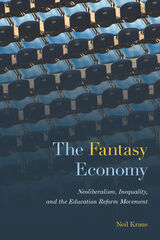
The Fantasy Economy
Neoliberalism, Inequality, and the Education Reform Movement
Kraus, Neil
Temple University Press, 2023
Wage stagnation, growing inequality, and even poverty itself have resulted from decades of neoliberal decision making, not the education system, writes Neil Kraus in his urgent call to action, The Fantasy Economy. Kraus claims the idea that both the education system and labor force are chronically deficient was aggressively and incorrectly promoted starting in the Reagan era, when corporate interests and education reformers emphasized education as the exclusive mechanism providing the citizenry with economic opportunity. However, as this critical book reveals, that is a misleading articulation of the economy and education system rooted in the economic self-interests of corporations and the wealthy.
The Fantasy Economy challenges the basic assumptions of the education reform movement of the last few decades. Kraus insists that education cannot control the labor market and unreliable corporate narratives fuel this misinformation. Moreover, misguided public policies, such as accountability and school choice, along with an emphasis on workforce development and STEM over broad-based liberal arts education, have only produced greater inequality.
Ultimately, The Fantasy Economy argues that education should be understood as a social necessity, not an engine of the neoliberal agenda. Kraus’ book advocates for a change in conventional thinking about economic opportunity and the purpose of education in a democracy.
The Fantasy Economy challenges the basic assumptions of the education reform movement of the last few decades. Kraus insists that education cannot control the labor market and unreliable corporate narratives fuel this misinformation. Moreover, misguided public policies, such as accountability and school choice, along with an emphasis on workforce development and STEM over broad-based liberal arts education, have only produced greater inequality.
Ultimately, The Fantasy Economy argues that education should be understood as a social necessity, not an engine of the neoliberal agenda. Kraus’ book advocates for a change in conventional thinking about economic opportunity and the purpose of education in a democracy.
[more]
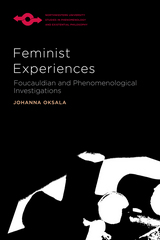
Feminist Experiences
Foucauldian and Phenomenological Investigations
Johanna Oksala
Northwestern University Press, 2016
Feminist Experiences develops and defends a distinctive understanding of feminist philosophy as social critique. Feminist philosophy is essentially a political endeavor, Johanna Oksala argues, aiming to expose, analyze, and ultimately change gendered power relations. However, such an understanding of feminist philosophy raises a host of theoretical problems and paradoxes. Oksala investigates the philosophical challenges and outlines the ontological presuppositions and methodological innovations the project requires.
Drawing on conceptual tools from the thought of Michel Foucault, but also from the tradition of phenomenology, she explores the role of experience in feminist philosophy and its relationship to language and linguistic meaning. Oksala concludes by sketching a feminist ontology of the present through a critical investigation of neoliberalism and the challenges it presents to feminist theory and politics.
Drawing on conceptual tools from the thought of Michel Foucault, but also from the tradition of phenomenology, she explores the role of experience in feminist philosophy and its relationship to language and linguistic meaning. Oksala concludes by sketching a feminist ontology of the present through a critical investigation of neoliberalism and the challenges it presents to feminist theory and politics.
[more]
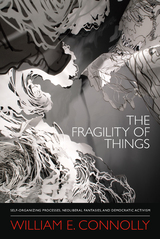
The Fragility of Things
Self-Organizing Processes, Neoliberal Fantasies, and Democratic Activism
William E. Connolly
Duke University Press, 2013
In The Fragility of Things, eminent theorist William E. Connolly focuses on several self-organizing ecologies that help to constitute our world. These interacting geological, biological, and climate systems, some of which harbor creative capacities, are depreciated by that brand of neoliberalism that confines self-organization to economic markets and equates the latter with impersonal rationality. Neoliberal practice thus fails to address the fragilities it exacerbates. Engaging a diverse range of thinkers, from Friedrich Hayek, Michel Foucault, Hesiod, and Immanuel Kant to Voltaire, Terrence Deacon, Friedrich Nietzsche, and Alfred North Whitehead, Connolly brings the sense of fragility alive as he rethinks the idea of freedom. Urging the Left not to abandon the state but to reclaim it, he also explores scales of politics below and beyond the state. The contemporary response to fragility requires a militant pluralist assemblage composed of those sharing affinities of spirituality across differences of creed, class, gender, sexual orientation, and ethnicity.
[more]
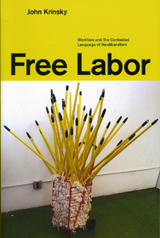
Free Labor
Workfare and the Contested Language of Neoliberalism
John Krinsky
University of Chicago Press, 2008
One of former New York City Mayor Rudolph Giuliani’s proudest accomplishments is his expansion of the Work Experience Program, which uses welfare recipients to do routine work once done by unionized city workers. The fact that WEP workers are denied the legal status of employees and make far less money and enjoy fewer rights than do city workers has sparked fierce opposition. For antipoverty activists, legal advocates, unions, and other critics of the program this double standard begs a troubling question: are workfare participants workers or welfare recipients?
At times the fight over workfare unfolded as an argument over who had the authority to define these terms, and in Free Labor, John Krinsky focuses on changes in the language and organization of the political coalitions on either side of the debate. Krinsky’s broadly interdisciplinary analysis draws from interviews, official documents, and media reports to pursue new directions in the study of the cultural and cognitive aspects of political activism. Free Labor will instigate a lively dialogue among students of culture, labor and social movements, welfare policy, and urban political economy.
At times the fight over workfare unfolded as an argument over who had the authority to define these terms, and in Free Labor, John Krinsky focuses on changes in the language and organization of the political coalitions on either side of the debate. Krinsky’s broadly interdisciplinary analysis draws from interviews, official documents, and media reports to pursue new directions in the study of the cultural and cognitive aspects of political activism. Free Labor will instigate a lively dialogue among students of culture, labor and social movements, welfare policy, and urban political economy.
[more]
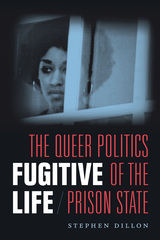
Fugitive Life
The Queer Politics of the Prison State
Stephen Dillon
Duke University Press, 2018
During the 1970s in the United States, hundreds of feminist, queer, and antiracist activists were imprisoned or became fugitives as they fought the changing contours of U.S. imperialism, global capitalism, and a repressive racial state. In Fugitive Life Stephen Dillon examines these activists' communiqués, films, memoirs, prison writing, and poetry to highlight the centrality of gender and sexuality to a mode of racialized power called the neoliberal-carceral state. Drawing on writings by Angela Davis, the George Jackson Brigade, Assata Shakur, the Weather Underground, and others, Dillon shows how these activists were among the first to theorize and make visible the links between conservative "law and order" rhetoric, free market ideology, incarceration, sexism, and the continued legacies of slavery. Dillon theorizes these prisoners and fugitives as queer figures who occupied a unique position from which to highlight how neoliberalism depended upon racialized mass incarceration. In so doing, he articulates a vision of fugitive freedom in which the work of these activists becomes foundational to undoing the reign of the neoliberal-carceral state.
[more]
READERS
Browse our collection.
PUBLISHERS
See BiblioVault's publisher services.
STUDENT SERVICES
Files for college accessibility offices.
UChicago Accessibility Resources
home | accessibility | search | about | contact us
BiblioVault ® 2001 - 2024
The University of Chicago Press









